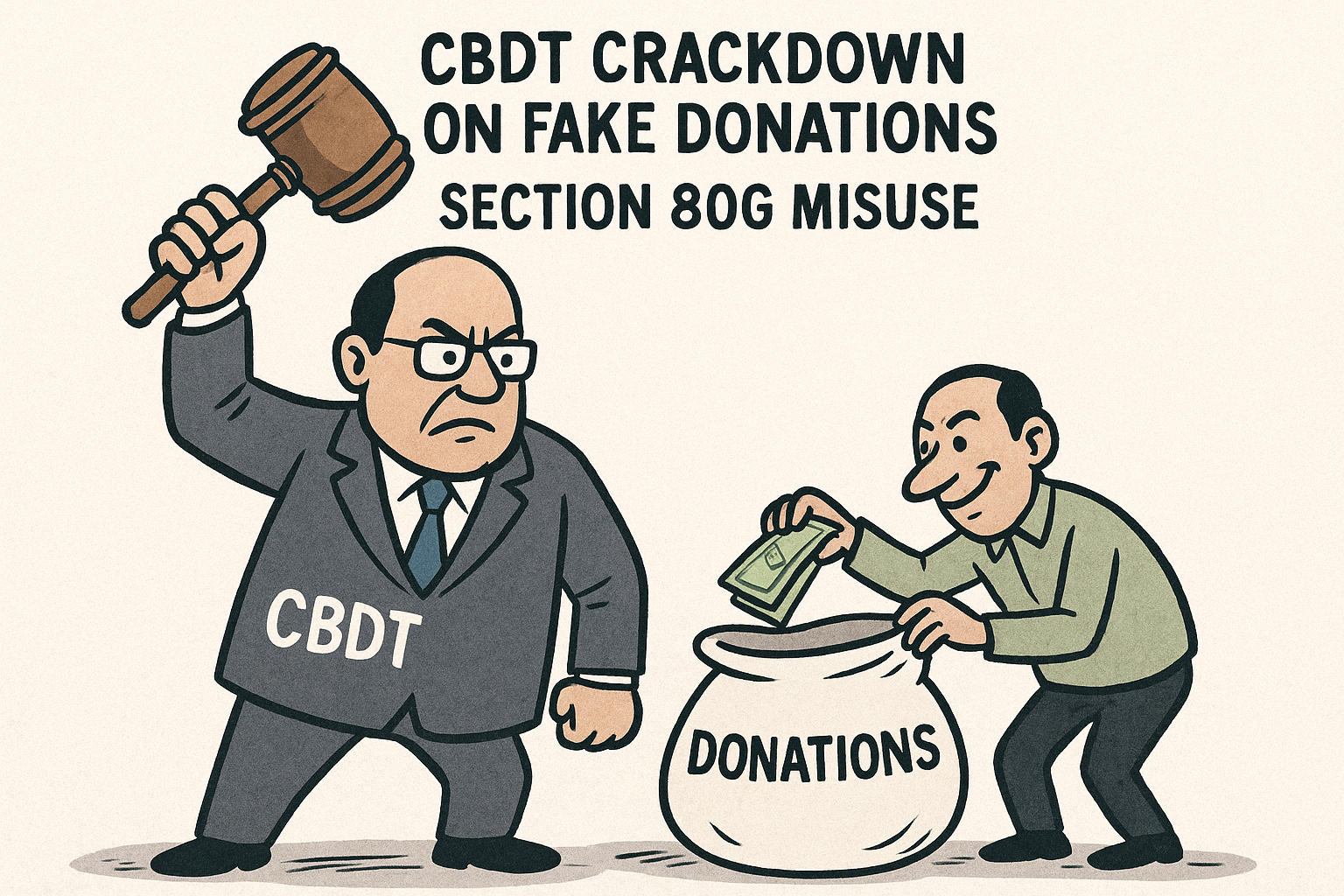The Central Board of Direct Taxes (CBDT) is taking strong action against fake donations being claimed under Section 80G of the Income Tax Act, 1961.
While Section 80G was introduced to encourage genuine philanthropy, investigations have revealed that some charitable trusts and donors are misusing it to evade taxes.
This misuse not only causes loss to the exchequer but also damages the credibility of real NGOs working for social causes.
Table of Contents
What is Section 80G?
- Purpose: To provide tax deductions for donations made to certain funds, charitable institutions, or NGOs.
- Benefit: Deduction can be 50% or 100% of the donation amount depending on the type of institution.
- Eligibility: Only donations made to institutions with valid 80G registration are eligible.
- Mode of Payment: No deduction is allowed for cash donations above ₹2,000 (Section 80G(5D)).
Example:
If you donate ₹50,000 to an NGO with 50% deduction eligibility under Section 80G, you can reduce your taxable income by ₹25,000.
How the Fake Donation Scam Works
CBDT investigations have found a well-planned method in such frauds:
- Fake Receipts Without Actual Donation
NGOs issue 80G donation receipts to donors who never actually donate. - Circular Cash Transactions
Donors give cash → NGO deposits in its bank account → NGO returns most of the cash to the donor (in black) after keeping a small commission (5–10%). - Misuse of Funds
Some NGOs use donation money for private investments, luxury expenses, or political funding instead of social causes. - Form 10BE Mismatch
Under new rules, NGOs must issue Form 10BE to donors and report it to the Income Tax Department. Many fake donations are caught when ITR claims do not match NGO filings.
Recent Real Cases
Case 1 – Gujarat NGO Scam (₹150 Crore Fake Receipts)
- Year: 2023
- Modus Operandi: A group of NGOs in Gujarat issued donation receipts without receiving actual donations. They took 5–7% commission and returned the rest in cash.
- CBDT Action:
- Cancelled 80G registration of all NGOs involved.
- Sent reassessment notices to 1,200 donors.
- Disallowed total fake deductions of over ₹150 crore.
Case 2 – Maharashtra Medical Trust Fraud (₹40 Crore)
- Location: Mumbai
- Activity: Claimed donations for treatment of poor patients.
- Fraud: 90% of donations routed back to donors.
- Outcome:
- ₹40 crore worth of deductions disallowed.
- Trustees charged with tax fraud under Sections 277 & 278 (prosecution possible).
Case 3 – Delhi Education NGO Scam (₹25 Crore)
- Finding: NGO’s Form 10BE entries did not match donor claims in ITRs.
- Donors: Mostly high-net-worth individuals trying to reduce tax liability.
- Action:
- Notices to over 400 donors.
- NGO blacklisted and barred from future registration.
CBDT Investigation Process
- Data Analytics & AI Scrutiny – Cross-verification of NGO filings, Form 26AS, AIS, and ITR claims.
- Mismatch Flagging – If donor claims do not match NGO filings, the case is flagged for review.
- Notices Issued – Both NGOs and donors receive scrutiny notices (Section 143(2) or 148A).
- On-Ground Raids – Conducted by Income Tax Investigation Wing.
- Legal Action – Penalties, interest, reassessment, and sometimes prosecution.
Legal Provisions Involved
- Section 80G – Governs deduction on donations.
- Section 80G(5D) – Disallows cash donations above ₹2,000.
- Section 271(1)(c) / 270A – Penalty for concealment/misreporting (up to 200% of tax evaded).
- Section 234B & 234C – Interest on unpaid tax.
- Sections 277 & 278 – Prosecution for false statements or abetment.
Impact on Taxpayers
If caught claiming fake donations:
- Deduction Disallowed – Taxable income increases.
- Additional Tax Demand – Along with interest.
- Penalty – Up to double the tax evaded.
- Prosecution – Jail term up to 7 years in serious fraud cases.
How to Protect Yourself
- Verify NGO’s 80G Status – Search on the Income Tax portal.
- Pay via Bank Mode – UPI, NEFT, RTGS, or cheque.
- Keep Valid Receipt – With trust name, PAN, 80G number, and date.
- Check Form 10BE – Must match your ITR claim.
- Avoid Cash Donations Above ₹2,000 – Non-compliance will result in denial of deduction.
CBDT’s Message
CBDT has made it clear – Tax benefit is a privilege, not a loophole.
Fake donation claims will be met with strictest possible legal action against both NGOs and donors.
Conclusion
The crackdown is expected to clean up the charity ecosystem in India.
For taxpayers, the takeaway is simple – donate only to genuine NGOs and keep your documentation ready.
Remember: Section 80G is for genuine social work, not for fake tax saving.
Contact taxgiveindia.com for ITR Filing and tax related services.
